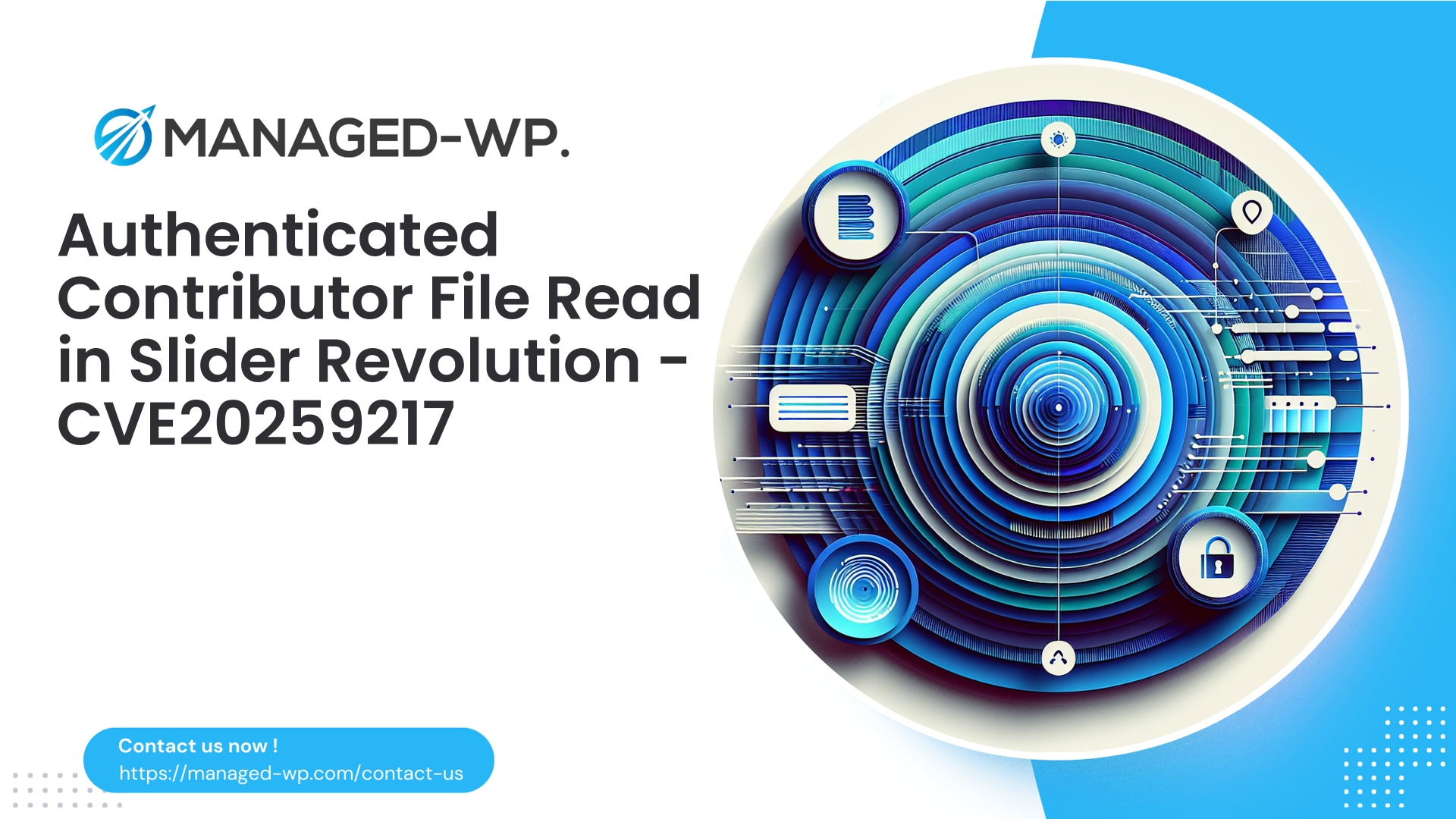| 插件名称 | 滑块革命 |
|---|---|
| 漏洞类型 | 已认证的任意文件读取 |
| CVE编号 | CVE-2025-9217 |
| 紧急 | 中等的 |
| CVE 发布日期 | 2025-08-29 |
| 源网址 | CVE-2025-9217 |
Slider Revolution(≤ 6.7.36)——贡献者认证的任意文件读取漏洞(CVE-2025-9217):网站所有者应立即采取的措施
作者:Managed-WP 安全团队
日期:2025年8月29日
概要总结——事件回顾及后续步骤
已确定的关键安全问题 CVE-2025-9217 此漏洞影响 Slider Revolution 插件版本 ≤ 6.7.36。拥有“贡献者”或更高级别访问权限且已通过网站身份验证的用户,可以读取您 Web 服务器上的任意文件。该漏洞源于对名为“name”的参数的输入验证和权限强制执行不足。 已使用的 SVG 和 已用图片攻击者可以利用这些漏洞访问预期媒体目录之外的敏感文件。
如果您的网站使用 Slider Revolution 插件,并且允许用户以“贡献者”或更高级别登录,则应立即采取以下措施:
- 将 Slider Revolution 插件更新至版本 6.7.37 或更高版本 立即修复此漏洞。
- 如果无法立即进行更新,则限制贡献者权限,禁用或限制媒体上传功能,并将 Web 应用程序防火墙 (WAF) 规则作为虚拟补丁应用,以阻止利用尝试。
- 检查日志中是否存在可疑活动,调查任何数据泄露迹象,轮换所有可能被泄露的凭证(包括数据库密码和 API 密钥),并执行全面的恶意软件扫描。
本文由一位美国安全专家概述了该漏洞、实用的缓解技术、取证检测指南以及保护 WordPress 网站安全的防御建议。
技术概述
该漏洞针对 Slider Revolution 的端点,这些端点通过以下方式处理“已使用”图像和 SVG 文件列表: 已使用的 SVG 和 已用图片 参数。遗憾的是,该插件并未正确验证这些输入,也没有强制执行严格的用户权限检查。因此,已通过认证的贡献者级别用户可以构造请求,强制插件读取并公开 Web 服务器上的任意文件。
存在风险的文件包括但不限于:
wp-config.php– 包含数据库凭据和盐值- 备份存档可能包含数据库转储和敏感数据
- 如果可通过 Web 根目录访问,则需要私钥或环境配置文件。
- 任何可通过 Web 服务器文件权限读取的文件
这是一个高度敏感信息泄露漏洞。虽然它不允许直接远程执行代码,但攻击者可以利用窃取的密钥来提升访问权限、进一步入侵网站或窃取敏感的客户和系统数据。
受影响版本和 CVE 详情
- 插件: 滑块革命
- 受影响版本: ≤ 6.7.36
- 已修复: 6.7.37
- CVE标识符: CVE-2025-9217
- 报道人: 外部安全研究人员
所需权限级别和利用上下文
- 用户必须至少拥有“贡献者”权限(或更高权限)才能通过身份验证。
- 攻击面包括插件 AJAX 或 REST 端点处理
已使用的 SVG和已用图片参数。 - 存在漏洞的网站允许贡献者级别或更高级别的用户角色与 Slider Revolution 中的媒体元素进行交互。
许多 WordPress 博客允许投稿者通过开放注册或社区发帖功能进行投稿——这增加了风险敞口。
剥削的潜在影响
- 关键配置文件被盗,导致网站完全被控制。
- 包含用户数据、凭证或 API 密钥的备份文件泄露。
- 访问私钥、环境变量和其他敏感信息。
- 可能因数据泄露而违反隐私法规。
- 在初始信息泄露后,协助进行远程代码执行等连锁攻击。
鉴于该插件的广泛使用以及漏洞的公开性,迅速修复至关重要。
漏洞利用原理——技术概要
- 该插件公开了一些端点,客户端可以通过这些端点提交列出图像和 SVG 资源的参数(
已使用的 SVG,已用图片). - 验证不足会导致文件路径被篡改,包括目录遍历序列(
../)和不支持的协议(文件://). - 该插件不会强制要求这些路径只能位于上传目录中,也不会通过严格的权限检查来限制超出贡献者级别的访问权限。
- 这样,插件就可以读取并返回经过身份验证的贡献者用户请求的文件内容。
我们不会发布漏洞利用代码,以免助长滥用行为,但建议所有网站管理员立即着重采取缓解措施和监控措施。
紧急情况检查清单 – 立即采取的行动
- 更新滑块革命: 立即升级到 6.7.37 或更高版本。
- 限制贡献者的访问权限:
- 尽可能限制或移除贡献者的功能。
- 审核并禁用不必要的新用户注册功能。
- 如果无法立即进行修补,请暂时停用 Slider Revolution。
- 强化用户角色:
- 审核具有“贡献者”或更高权限的帐户,并撤销可疑或未使用的帐户。
- 请谨慎限制上传权限。
- 实施WAF虚拟补丁:
- 阻止包含可疑参数值的请求,这些参数值表明存在目录遍历或文件方案滥用行为。
- 限制非管理员用户对易受攻击的 AJAX 端点的访问。
- 分析日志中的指标:
- 检查插件请求中引用的文件是否存在异常参数值,例如
wp-config.php,.env备份,或使用遍历字符串。
- 检查插件请求中引用的文件是否存在异常参数值,例如
- 如果怀疑发生安全漏洞,请立即轮换所有敏感凭证。
- 进行全面的安全扫描 查找恶意软件、后门和入侵迹象。
检测与监测建议
配置日志记录和监控功能,以捕获以下可疑活动:
- 任何发送到包含以下内容的管理 AJAX 或插件端点的 POST 或 GET 请求
已使用的 SVG,已用图片或类似参数。 - 具有目录遍历模式的请求,例如
../,%2e%2e%2f或文件协议前缀(file:,php:). - 请求访问敏感文件,例如
wp-config.php,.env备份文件(*.zip、*.sql)或私有目录。 - 来自同一 IP 地址或帐户的重复扫描尝试。
针对这些特征建立警报,以便及早发现违规行为。
通过 Web 应用程序防火墙 (WAF) 进行虚拟修补
当无法立即更新插件时,请实施 WAF 规则,根据以下标准阻止恶意请求:
- 拦截 AJAX 调用
/wp-admin/admin-ajax.php带参数已使用的 SVG或者已用图片. - 阻止包含目录遍历模式的请求(
../,%2e%2e%2f等等)或可疑计划(文件://,php://,数据:). - 限制只有管理员用户才能访问 revslider 端点。
- 禁止通过插件调用直接访问敏感文件名(例如,
wp-config.php,.env(备份文件)。 - 对每个 IP 地址和用户实施速率限制,以阻止暴力破解或自动扫描。
规则逻辑示例:
If request URI contains "/wp-admin/admin-ajax.php" AND parameters include "used_images" or "used_svg": IF parameter value matches regex: (\.\./|%2e%2e%2f|file:|php:|/etc/|wp-config|\.env|\.sql|\.zip) THEN block request and log event
笔记: 始终先在测试环境中部署和测试 WAF 规则,以防止误报和业务中断。
建议的WAF响应措施
- 阻止可疑请求 返回 403 禁止访问。
- 记录所有相关的请求详情包括标头、用户会话信息和 IP 地址。
- 请通知您的安全团队 立即展开调查。
- 标记受影响的用户帐户 以便进一步审查或隔离。
Managed-WP 客户可受益于预配置的 WAF 规则,这些规则能够自动检测并阻止此漏洞。我们的免费套餐还提供必要的基线保护,以便及早缓解风险。
事后攻击事件响应
- 立即隔离或关闭受影响的网站,以防止进一步延误清理工作。
- 保留所有日志,并创建服务器和数据库的取证快照以进行分析。
- 轮换所有暴露的密钥,包括数据库凭据、API 密钥和任何令牌。
- 进行彻底的恶意软件扫描,重点检查后门、可疑文件和异常管理员用户。
- 如果确认网站遭到入侵,则从已知的干净备份中恢复网站。
- 加强环境安全:重新安装核心插件/主题,强制执行多因素身份验证,并限制特权用户访问权限。
- 请确保 Slider Revolution 以及所有其他插件和主题都已更新到 6.7.37 或更高版本。
记录所有补救措施和经验教训,以符合监管要求和保险索赔要求。
WordPress 安全加固通用建议
- 保持所有 WordPress 核心文件、插件和主题更新到最新稳定版本。
- 限制“贡献者”及以上级别的用户角色,仅限受信任人员;移除不必要的上传功能。
- 添加
定义('DISALLOW_FILE_EDIT',true);在wp-config.php禁用控制面板内的代码编辑功能。 - 移除未使用或过时的插件和主题,以减少攻击面。
- 定期进行异地备份,并定期进行恢复测试。
- 实施文件完整性监控,以检测可疑或未经授权的更改。
- 强制使用强密码,对管理员启用多因素身份验证 (MFA),并在可行的情况下限制 IP 地址。
面向插件开发者的安全编码建议
集成媒体处理功能的插件作者应遵循最佳安全实践:
- 在服务器端强制执行适当的权限检查,以限制文件访问权限,仅限授权用户访问。
- 实施严格的路径白名单机制,仅限于已知的安全目录,例如 WordPress 上传文件夹。
- 规范化和清理所有输入参数,以拒绝目录遍历和不支持的 URI 方案。
- 除非获得相应权限的用户请求,否则避免返回原始文件内容。
- 利用 WordPress 文件系统 API 和预先准备好的方法安全地访问文件。
- 加入详细的日志记录和速率限制功能,以检测和阻止滥用行为。
贡献者级别漏洞的常见原因及工作流程调整
许多 WordPress 网站允许用户生成内容,并接受外部贡献。贡献者通常可以创建内容,但不应拥有媒体上传或不受限制的文件访问权限。
为降低风险,网站管理员应:
- 重新考虑贡献者角色是否需要上传权限,如果不是必要,则撤销这些权限。
- 社区内容提交应采用审核或管理员批准的工作流程,而不是直接上传。
- 使用沙盒或隔离服务来处理用户上传的媒体,以防止插件级文件访问滥用。
真实世界的攻击场景
- 机会主义攻击者: 对 Slider Revolution 的易受攻击版本进行大规模扫描,并尝试使用凭证填充或开放注册漏洞来提取敏感配置文件。
- 定向入侵: 利用窃取的密钥和备份,入侵贡献者帐户以提升权限。
- 数据盗窃: 从备份文件中提取客户个人身份信息(PII)和业务敏感数据。
- 横向移动: 使用窃取的凭证访问外部服务,例如云存储或电子邮件系统。
漏洞披露后,自动化攻击会迅速出现——必须立即修补并进行监控。
Managed-WP 如何保障您的安全
Managed-WP 提供全面的分层安全解决方案,可在漏洞披露前后保护网站:
- 管理型 WAF 规则可自动检测并阻止遍历和未经授权的文件访问尝试。
- 虚拟修补功能可在插件无法立即更新时立即降低风险。
- 定期进行恶意软件扫描和文件完整性检查,以识别入侵迹象。
- 精细化的警报和取证日志捕获,以协助事件响应团队。
我们的基本(免费)计划提供必要的托管防火墙保护,包括 OWASP Top 10 防护和恶意软件扫描,从而在修复工作期间实现快速启动安全保护。
立即获得保护 – 从 Managed-WP Basic(免费)开始
标题: 使用 Managed-WP Basic 立即保护您的 WordPress 网站
如果您在更新 Slider Revolution 和审核用户角色时需要快速便捷的防护,不妨试试我们的免费托管防火墙方案——Managed-WP Basic。它提供托管式 WAF 防护、无限带宽、恶意软件扫描以及针对常见网络风险的保护,而且完全免费。设置只需几分钟,即可立即增强您的安全防护能力。
请在此注册: https://my.wp-firewall.com/buy/wp-firewall-free-plan/
需要高级自动化虚拟补丁、定期安全报告或事件响应支持?我们的标准版和专业版套餐提供增强型、全面的安全服务。
常见问题 (FAQ)
问: 我的网站上没有投稿人账户——这样安全吗?
一个: 如果只有管理员账户才能登录,攻击面虽然会缩小,但并不能完全消除。务必及时更新漏洞信息,因为凭据可能被盗,或者存在其他攻击途径。
问: 未经身份验证的攻击者能否利用此漏洞?
一个: 不。利用此漏洞需要贡献者级别或以上级别的认证访问权限。但是,开放用户注册或允许创建帐户的插件的网站仍然存在安全隐患。
问: 我已经更新了系统,但在日志中发现可疑活动——我该怎么办?
一个: 更新是第一道防线。遵循攻击后响应协议:保留日志、轮换凭据、扫描恶意软件,并在必要时从干净的备份中恢复。
来自托管 WordPress 安全专家的最后总结
此漏洞表明,当媒体管理功能与不当的验证和权限强制措施结合使用时,可能会无意中增加风险。6.7.37 版本补丁修复了此漏洞,因此更新是您的首要任务。
然而,并非所有站点都能立即进行修补。通过托管式Web应用防火墙 (WAF) 实现角色强化、监控和虚拟修补等多层防御措施,可以提供强有力的保护,直到您能够完全修复问题。
我们的托管WP安全团队随时准备协助进行虚拟补丁部署、实时监控和事件响应,以确保您的资产安全。
参考文献及延伸阅读
- CVE-2025-9217 — 公共 CVE 数据库
- Slider Revolution 插件更新日志 — 升级至 6.7.37 版本
- WordPress 安全加固指南和角色管理文档
如果您在应用 WAF 规则方面需要专家帮助,或者需要快速进行安全审计以评估您的风险并清理您的网站,请联系 Managed-WP 支持团队。不妨先考虑我们的免费方案,以获得即时的基础保护: https://my.wp-firewall.com/buy/wp-firewall-free-plan/



















